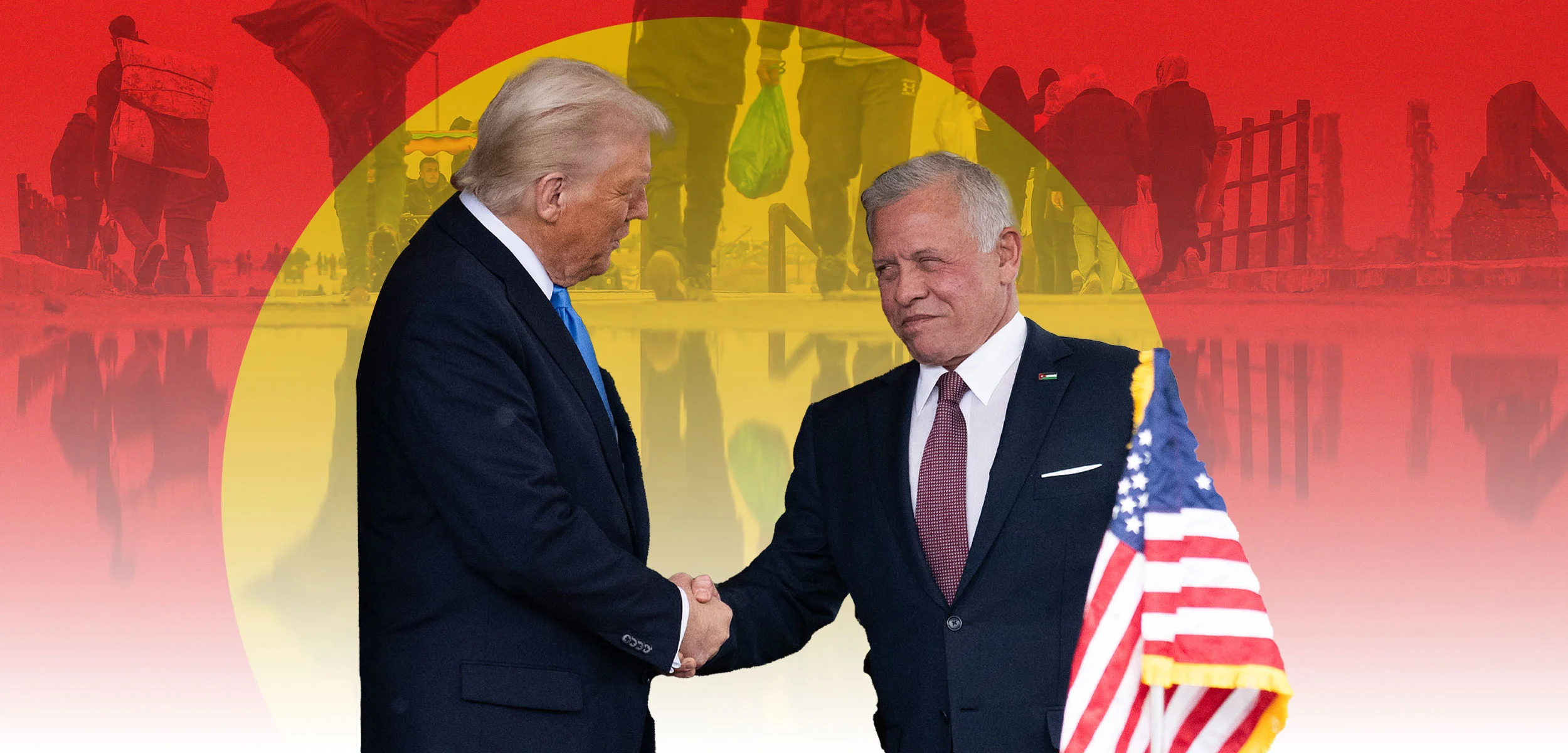When a King is placed under threat in a game of chess, the playeris left with few options: move their King to safety, eliminate the attack, or sacrifice another piece by placing it between the king and the threat. If none of these moves are possible, the game ends in a checkmate.
As in politics, chess can only conclude in one of three scenarios: either a draw, surrender, or defeat.
So, which square did the King of Jordan stand on last week during his meeting with the US president at the White House? Especially considering the tensions between them since Trump's first term, when King Abdullah opposed the "Deal of the Century." Was the Hashemite monarchy able to shift the US administration’s stance, even slightly, regarding the displacement of Gaza’s residents to his country and Egypt?
When a King is placed under threat in a game of chess, the playeris left with few options: move their King to safety, eliminate the attack, or sacrifice another piece by placing it between the king and the threat. If none of these moves are possible, the game ends in a checkmate.
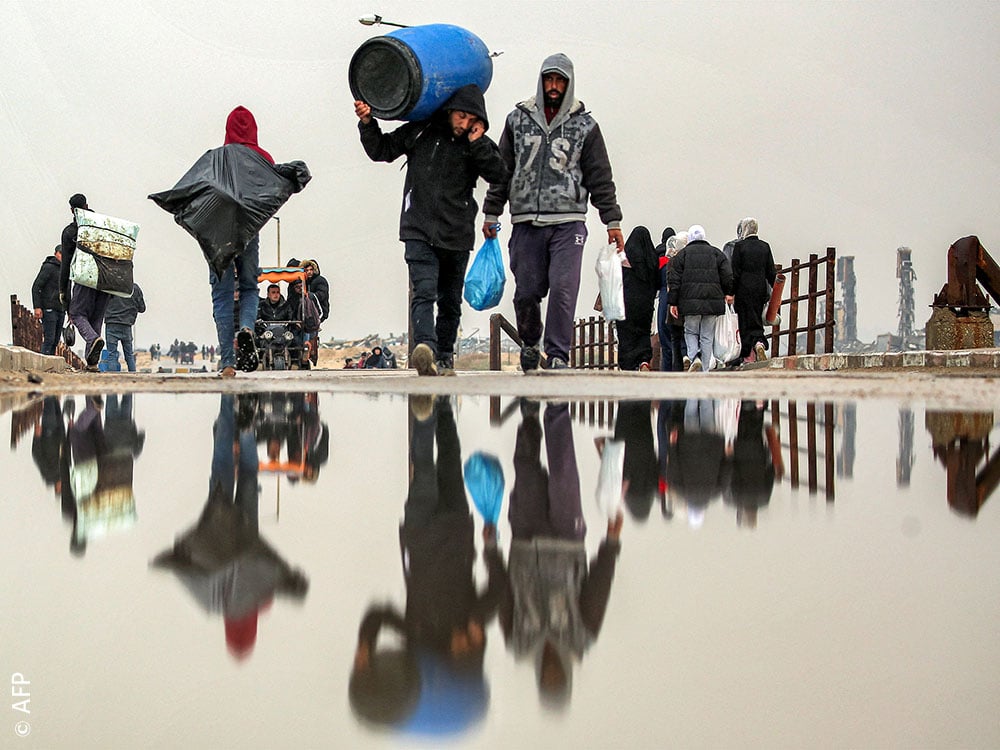 Either displacement or ‘checkmate’? What did King Abdullah really do in Washington? |
Either displacement or ‘checkmate’? What did King Abdullah really do in Washington? |
Was it a surprise press conference?
During his meeting with US President Donald Trump, King Abdullah attempted to maintain the last thread of diplomacy —particularly when he was seemingly caught off guard by the American press. The press conference was not originally scheduled for the visit, and, according to American journalists, the Jordanian entourage was surprised when the doors suddenly opened in front of them.
Notably, the monarch deferred all his responses to the future, stating that Arab nations would present their position on Trump’s Gaza plan at the upcoming summit in Cairo on the 27th of this month. Even more striking was his emphasis on waiting for the positions of other Arab countries, stressing that "we must wait for Egypt’s plan," and adding that "the matter must be discussed in Saudi Arabia,” indicating that the Arab stance would be unified, pointing to the significance of the upcoming Cairo summit.
But criticism for King Abdullah emerged when he noted that he had to act “in the best interest of my country.” On the surface, this phrase differs from decades of Hashemite rhetoric and declarations that linked Jordan’s interests to Palestinian self-determination, particularly through the prism of the two-state solution. Spectators interpreted his vague response to Trump’s demands as a shift in position, even a betrayal of the Palestinian cause.
Following the meeting, however, King Abdullah reaffirmed on X that Jordan’s stance remains firmly against the displacement of Palestinians—something he had not mentioned in the presence of the U.S. president, or during his “surprise” press conference.
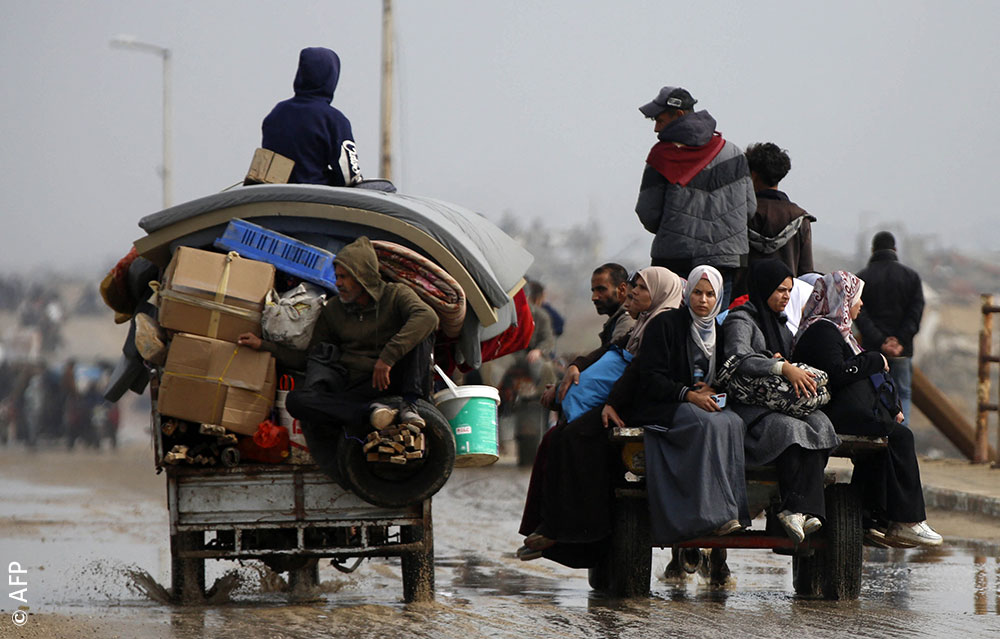 Either displacement or ‘checkmate’? What did King Abdullah really do in Washington? |
Either displacement or ‘checkmate’? What did King Abdullah really do in Washington? |
What’s worse than the Deal of the Century?
In 2018, during U.S. President Donald Trump's first term, his team, led by son-in-law Jared Kushner and special envoy Jason Greenblatt, proposed the establishment of a confederation between Jordan and Palestine as part of their plan to resolve the Palestinian-Israeli conflict, coining it the “Deal of the Century.”
Of course, the plan at the time was to actually annex what remained of the West Bank (1967 borders) to Jordan, and for Israel to seize the rest, including Jerusalem, which is recognized as the capital of Palestine under international law, and the Al-Aqsa Mosque, which falls under Hashemite custodianship.
Criticism for King Abdullah emerged when he noted that he had to act “in the best interest of my country.” On the surface, this phrase differs from decades of Hashemite rhetoric and declarations that linked Jordan’s interests to Palestinian self-determination. Spectators interpreted his vague response to Trump’s demands as a shift in position, even a betrayal of the Palestinian cause.
At the time of the deal’s proposal, rumours circulated Jordan’s political circles about an imminent coup attempt that almost shook the Hashemite palace. As a result, Jordan's former Crown Prince, Prince Hamzah bin Hussein, was placed under house arrest.
At the time, the coup attempt was linked to rumors that the popular former crown prince, who had support among some tribal factions, would, if crowned King, agree to pass the “Deal of the Century” proposed by the Trump administration, which King Abdullah had rejected. Some claimed that the attempted coup was known to Saudi authorities in advance, particularly through Bassem Awadallah, a former Royal Court Chief in Jordan who holds Saudi citizenship and acted as an adviser to the Saudi Crown Prince. Saudi officials vehemently denied this, but their press releases did little to ease the heightened tensions between the two countries.
This story may seem like a chapter from the past, but it has resurfaced today with Trump’s return to the presidency for a second term. His vision has moved beyond the previous “confederation project” and the Deal of the Century to focus on the forced displacement of Gaza's population and Israel’s annexation of the West Bank. All this coincides with the beginning of Trump's second presidential term, meaning he still has four years to materialize his vision and exert pressure on the relevant governments.
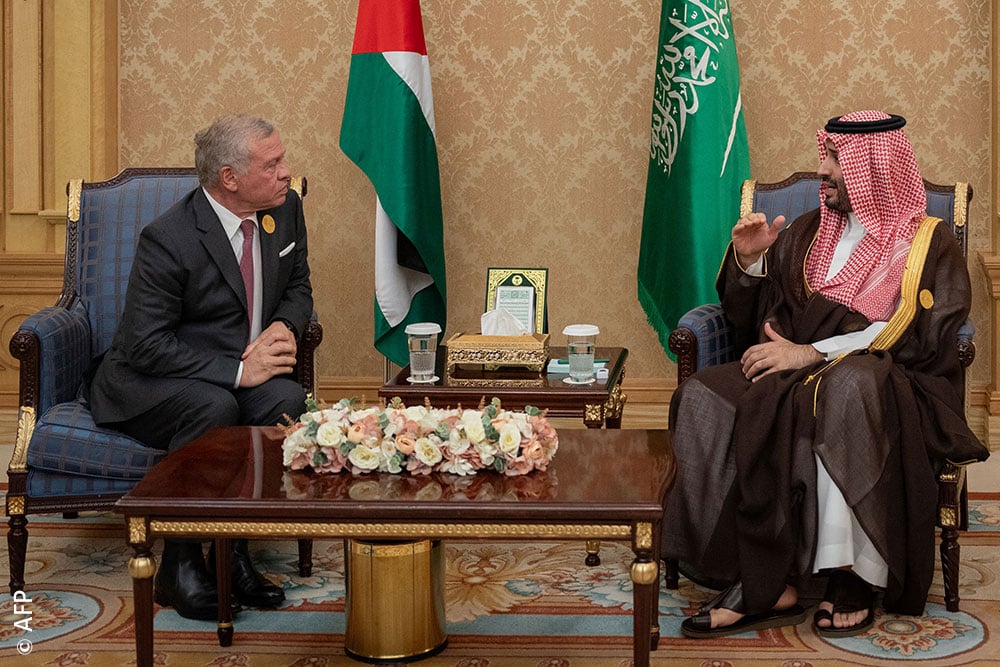 Either displacement or ‘checkmate’? What did King Abdullah really do in Washington? |
Either displacement or ‘checkmate’? What did King Abdullah really do in Washington? |
‘Or else’... Cutting US aid to Jordan
This is not the first time the U.S. has cut its aid to Jordan. This "punishment" happened previously, also under Republican leadership, due to King Hussein’s stance on the Gulf War in 1991. The US Congress suspended a $50 million aid package in response to Jordan’s refusal to join the coalition that attacked Iraq. This resulted in catastrophic economic consequences and stringent austerity measures that the Kingdom suffered for many years.
However, the impact at that time is nothing compared to what today’s decision could bring to the economy. Back then, Iraqi President Saddam Hussein decided to support Jordan by providing it with oil at highly discounted preferential rates, which helped mitigate the economic fallout.
Today, the full economic effects that will be caused by the U.S. presidential decision to stop aid to Jordan are still not clear, but this aid has been vital to the country's economic and security stability, especially when it comes to military support. It is worth noting that U.S. assistance represents more than 40% of the total foreign aid Jordan receives annually.
This story may seem like a chapter from the past, but it has resurfaced today with Trump’s return to the presidency for a second term. His vision has moved beyond the previous “confederation project” and the Deal of the Century to focus on the forced displacement of Gaza's population and Israel’s annexation of the West Bank. All this coincides with the beginning of Trump's second presidential term, meaning he still has four years to materialize his vision and exert pressure on the relevant governments.
A quick calculation of the numbers published on the official websites of the U.S. State Department, the U.S. Embassy in Jordan, and Jordan’s General Budget Department shows that cutting US aid would lead to an economic collapse in the short term, unless Jordan is able to secure rapid loans to cover the sudden budget deficit, which would increase public debt and the cost of servicing it in the long run.
Public expenditures are estimated to be around $17.62 billion, while public revenues are estimated at about $14.41 billion, indicating an expected deficit of $3.21 billion, according to Jordan's draft general budget law for the fiscal year 2025.
Jordan was expected to receive $2.1 billion in US aid in 2025. If this aid were to entirely cut, the country’s deficit would increase to approximately $5.31 billion, representing a 65.5% surge in the expected deficit size.
To understand the implications of these figures, Jordan’s total current debt is approximately $62.21 billion, with annual debt service reaching about $3.65 billion. If Jordan borrows an additional $5.31 billion to cover the deficit, the total debt will rise to around $67.52 billion, and annual debt service will increase to about $3.91 billion, an annual increase of $265.5
The United States committed to providing annual aid to Jordan totaling $1.45 billion from 2023 to 2029, according to the memorandum of understanding between the two countries signed in September 2022. The distribution is arranged as follows:
Direct economic support to the Jordanian budget: $610 million.
Military funding: $400 million to enhance the capabilities of the Jordanian Armed Forces.
Development programs: $350 million for development projects implemented by the US Agency for International Development (USAID) in cooperation with the Jordanian government, focusing mainly on health, education, and infrastructure rehabilitation projects.
Reform incentives: $75 million to support economic reforms and the public sector in Jordan.
Additionally, in recent years, the United States has provided direct financial grants to support Jordan’s budget, amounting to $845 million in 2021, with the same amount allocated in the 2022 appropriations bill.
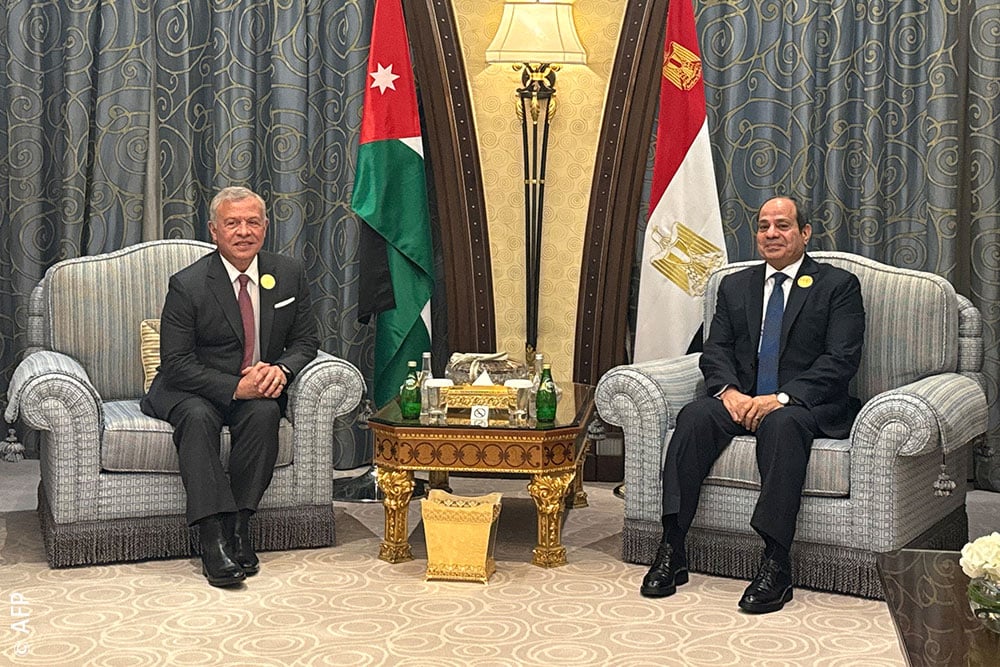 Either displacement or ‘checkmate’? What did King Abdullah really do in Washington? |
Either displacement or ‘checkmate’? What did King Abdullah really do in Washington? |
Hearts turn to Egypt, as eyes remain on Saudi Arabia
With the King returning without the U.S. president backing down from the decision to cut aid, and without opening the door to re-discuss the decision on forced displacement, there were strong reactions rarely seen from traditional US allies in the region: Egypt, Saudi Arabia, and Jordan.
Jordanian newspapers described the meeting as diplomatic and cautious, while Jordanian Foreign Minister Ayman Safadi completed the picture of Jordan's stance in a follow-up meeting where he clarified what had been left out of media coverage regarding the discussions between King Abdullah and Trump. He stated that "the King affirmed to Trump that Jordan will not allow the forced displacement of Palestinians."
Strikingly, both the Palestinian Authority and Hamas—despite being political opponents—welcomed what was described as "the King's [rejection] of displacement."
In Egypt, shortly after the initial statements from the meeting were released, the Egyptian presidency made an official announcement postponing President Abdel Fattah el-Sisi’s visit to Washington. This left room for interpretations regarding a possible "Egyptian discontent" with the Jordanian King's remarks. Meanwhile, some media platforms framed it as “Sisi closing the door in Trump’s face.”
Sources from multiple media outlets had previously indicated that Sisi was expected to meet with Trump at the White House on February 18, though no official confirmations were given. These leaks emerged after Egyptian Foreign Minister Badr Abdelatty visited Washington and met with his American counterpart, Marco Rubio, where he conveyed the collective Arab rejection of Trump’s plan to displace Palestinians from Gaza and seize control of the territory.
Notably, Egypt was not subjected to a US aid cut like Jordan, as its annual aid package is a binding provision for the United States under the annexes of the Camp David Accords.
The Egyptian presidency announced the cancellation of President Sisi's visit to Washington, while Saudi Arabia maintained its firm stance.
Saudi Arabia's official position remained unchanged. During a cabinet session held last Tuesday, chaired by Crown Prince Mohammed bin Salman, the Saudi government reiterated its firm rejection of what it called "extremist Israeli statements regarding the displacement of the Palestinian people from their land."
Perspectives from Jordan
Jordanian political analyst and lecturer in strategic security, Dr. Omar Alradad, told Raseef22 that the US-Israeli agenda directly and clearly targets both Jordan and Egypt, and that this targeting is a direct consequence of the events of October 7.
"The meeting was portrayed as if the King was heading to Washington to declare war on the US or as if relations between the two countries were about to be severed, especially with Trump’s threat to cut aid to Jordan,” Dr. Alradad about the analyses emerging after the meeting.
“However, Jordan does not adopt mobilizational or revolutionary rhetoric; it acts calmly and with diplomacy. The US president and American media attempted to embarrass the King through pointed questions, but I believe the King had a clear strategy—to de-escalate and temper Trump’s impulsiveness.
“While it is true that Trump did not budge on his positions, he spoke in a non-confrontational tone when reaffirming his agenda and proposals he presented to the Israeli right. On the other hand, the King used diplomatic phrasing to present his own perspectives without provoking Trump. A particularly significant move was his decision to tie any final answers to the broader Arab position—specifically that of Egypt and Saudi Arabia—emphasizing the Egyptian plan and Crown Prince Mohammed bin Salman’s initiative."
AlRadad also pointed out that attacks from media outlets affiliated with the Muslim Brotherhood and Hamas, which sought to cast doubt on Jordan’s positions, actually predated the King’s visit to Washington. He described this as part of an ongoing campaign targeting Jordan since October 7.
"This is a result of Jordan’s moderate stance. As a sovereign nation, Jordan respects its commitments and differentiates between the Palestinian people’s cause and the Hamas movement,” he added. “This distinction has always been a delicate balancing act for Jordan. The Kingdom does not align with Hamas; rather, it stands for peace, supports the establishment of a Palestinian state, and recognizes the legitimate Palestinian Authority.
"I don’t think Jordan will take a unilateral stance; rather, its position will be part of a unified Arab framework and strategy. I anticipate that this will be a bold and unexpected Arab project, potentially signaling an entirely new Arab stance—one that will provide answers to the pressing questions surrounding the current situation in Gaza."
Meanwhile, former Jordanian MP Jamil Nimri believes that the King’s visit aimed to put forth alternative proposals to Trump’s, creating room for negotiation. He referenced the Jordanian Foreign Minister’s post-meeting remarks, which highlighted the importance of the Arab plan and the stance toward Trump’s proposals—at the core of which is the assertion that reconstruction does not require displacement.
He explained that the key factor now is the position of Egypt and Saudi Arabia, which will have broad Arab backing.
“Saudi Arabia’s stance is clear—it will leverage its role as a regional leader that cannot remain on the sidelines while the US-Israeli project seeks to push displacement onto Jordan and Egypt. Instead, Saudi Arabia, in coordination with Egypt, will spearhead a counter-initiative. We can see that the Levantine position has become clearer and more cohesive, showing a serious commitment to presenting a political front against the extreme Israeli right-wing agenda."
Nimri also pointed out that this moment presents an opportunity to establish a unified Arab alliance that prevents external powers from isolating individual nations—whether through pressure on Jordan via economic means, on Egypt through incentives, or on Saudi Arabia through normalization efforts, especially since he believes Iran no longer poses an imminent threat to the Gulf, and Turkey, having secured its desired influence in Syria, is now open to regional cooperation. Given these conditions, the environment is ripe for a strategic and unified Arab partnership.
Raseef22 is a not for profit entity. Our focus is on quality journalism. Every contribution to the NasRaseef membership goes directly towards journalism production. We stand independent, not accepting corporate sponsorships, sponsored content or political funding.
Support our mission to keep Raseef22 available to all readers by clicking here!
Interested in writing with us? Check our pitch process here!
